A series of comment pieces discuss the circular economy – where industrial outputs become inputs so that goods at the end of their life turn into resources for other uses. In the first article Walter Stahel, who coined the concept of the circular economy, argues it is time to shift to a “resource-miser” economy. He […]
Category: Paper of Interest
Conservations silver bullet
Removing invasive mammals has major benefits to an island ecosystem, according to a new study. As this type of conservation effort is expensive, researchers set out to understand the impact of this strategy. The benefits they saw “highlight the importance of this conservation measure for protecting the world’s most threatened species.” Original research paper published in the Proceedings of […]
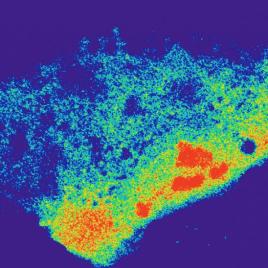
Tracking RNA in real time
By modifying the CRISPR-Cas9 system, typically used for genetic editing, researchers are able to visually track the movement of RNA in living cells. The researchers believe this could be used to study disease-related RNA processes. Many diseases are related to errors in RNA and RNA transcription, such as different cancers and autism. In the future […]
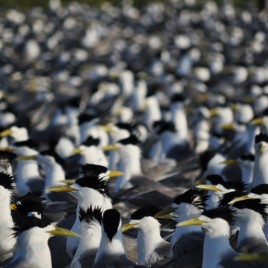
A bird’s eye view of birds
The view seen by humans (left) and drones (right) when trying to count seabird populations from either the ground or the air. (Image credits: Jarrod Hodgson) A new study compares the accuracy of monitoring of sea bird colonies by UAVs and traditional human ground counts and demonstrates that population estimates can be improved with this […]
How much warming has China caused?
As China has become increasingly industrialized over the past few decades its fossil fuel use has grown, along with its greenhouse gas emissions, and particulate air pollutants. Yet new research shows that its contribution to global warming has remained remarkably stable. Authors of this study show that China is responsible for about ten per cent […]
The next miracle cure – exercise
Physical activity and specific exercises have been shown to be effective in alleviating the symptoms of many chronic health conditions such as knee osteoarthritis, low back pain, and chronic obstructive pulmonary disease (COPD). However a new review shows these exercises are being under-prescribed by physicians. The authors suggest this is due to a lack of […]
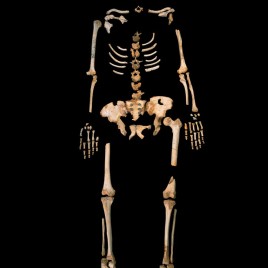
Filling in the family tree: The Sima de los Huesos hominins
Hominins found in the Sima de los Huesos (“pit of bones”) in northern Spain are more closely related to Denisovans than Neanderthals, according to genetic analysis. Until now it has been unclear how the 28 individuals were related to other hominins living during the Late Pleistocene. Analyzing the mitochondrial DNA lead the authors to conclude […]
Measuring the munchies – how much THC is in marijuana edibles?
A new way to more accurately measure the amount of cannabinoids in marijuana edibles was presented at the meeting of the American Chemical society March 15, 2016. In the past measurements were frequently inaccurate as the sugars, fats, and starches found in most edibles would clog the analytical device. By using dry-ice and a silica […]
Poor health in prisons
Canadians in jails and prisons are more likely to have mental health or substance abuse issues compared to the general population, according to a review of the available evidence. Additionally Canadians in jail or prison are more likely to attempt suicide. More than half of the individuals incarcerated in federal or provincial prisons and jails […]
Strengthening the link between Zika and microcephaly
Evidence supporting the link between the Zika virus and microcephaly has been found in a retrospective study of the outbreak in French Polynesia between October, 2013 and April, 2014. Researchers examined medical records to find cases of microcephaly between September, 2013 and July, 2015. They found eight cases of microcephaly during this time, seven of […]
Screening for lung cancer – New Canadian guidelines
New lung cancer screening guidelines have been released by the Canadian Task Force on Preventive Health Care. The guidelines take into account the latest evidence and aim to balance the benefits of early detection against the harms caused by overdiagnosis and invasive testing. The new guidelines recommend annual CT scans for adults aged 55-74 years […]
Growing hearts in 3D
Growing realistic human tissue outside the body is now possible thanks to the recently developed “person-on-a-chip” according to researchers at University of Toronto. The new technology, called AngioChip, could one day be used to repair or even replace damaged organs. In the meantime the researchers believe their development offers a new tool for discovering and testing […]

Improving cataracts outcome using stem cells
A new study is showing that preserving the stem cells within the eye might be a more effective way to treat cataracts, at least in children. Researchers surgically removed the damaged lens using a new technique that allowed them to preserve the lens epithelial stem cells. The minimally invasive surgery facilitated functional lens regeneration in […]
Meat - The great evolutionary kickstarter
It was the addition of meat into the human diet, along with tool use, that could have contributed to our ancient ancestors’ improved speech and the ability to regulate body temperature, researchers suggest. In the past the cooking of food was thought to drive the changes in tooth size and facial features of our ancestors. […]
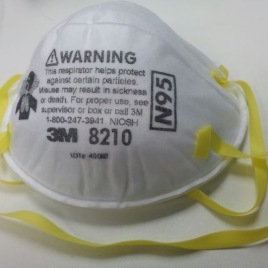
Protecting healthcare workers – Masks v. Respirators
Respirators and surgical masks both help protect health workers from respiratory infections, however there has been a debate about which is more effective and different guidelines provide different recommendations. A review of the accumulated evidence does not suggest that the N95 respirator is superior to surgical masks. The authors suggest a randomized controlled trial, […]
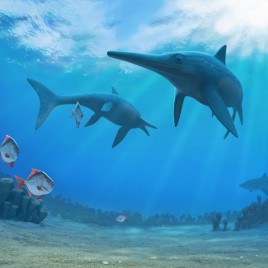
Solving the Disappearance of the Ichthyosaur
The Ichthyosaur, a dolphin-like reptile, ruled the oceans at the time of the dinosaurs, but then disappeared from the fossil record. Now new research seems to have figured out why. Their demise appears to be the result of climate change and a slow rate of evolution. Ichthyosaurs became extinct 90 million years ago, 28 million […]